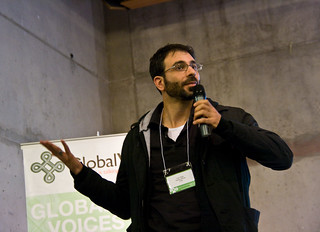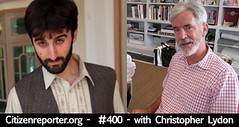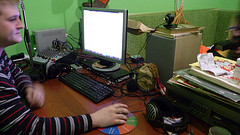
Global Voices Online has come a long way since the days of being all about blogs from around the world. Just as the technology for publishing online and having conversations about issues that effect our lives has evolved, so too has this international project dedicated to multi-lingual, multi-cultural, grassroots reporting. In 2012 GVO are into more than just providing a place for translation and reporting, they’ve moved into specialized projects relating to advocacy, socio-cultural projects and protecting citizen journalists around the world. At this year’s Re:publica12 conference, I had a chance to finally sit down with Ivan Sigal, executive director of Global Voices Online, and we spoke about these new frontiers and how he sees where we are today as global citizens of many languages examining the world around us.

 He was podcasting before there was podcasting. Looking to the online conversations and connections between old and new media long before any media company understood what was going on. He’s a global citizen who has a talent for finding inspiring voices and teaching us about our world. His is a voice I hear in my head whenever I turn on a microphone or ask a question. Who better to talk about the past, present, and future of this thing we do on this website and beyond, than Christopher Lydon. He was there making podcasts long before anyone else back in 2002, when I starting recording my own program in 2004, his
He was podcasting before there was podcasting. Looking to the online conversations and connections between old and new media long before any media company understood what was going on. He’s a global citizen who has a talent for finding inspiring voices and teaching us about our world. His is a voice I hear in my head whenever I turn on a microphone or ask a question. Who better to talk about the past, present, and future of this thing we do on this website and beyond, than Christopher Lydon. He was there making podcasts long before anyone else back in 2002, when I starting recording my own program in 2004, his 
 India Unheard is a new project by VideoVolunteers which focuses on helping develop a network of citizen journalists and concerned video citizens throughout India. My guests, BaghdadBrian and Stalin K, are both involved with the project and agreed to talk to me and explain what VV is, the idea behind India Unheard, and the evolution of the project.
India Unheard is a new project by VideoVolunteers which focuses on helping develop a network of citizen journalists and concerned video citizens throughout India. My guests, BaghdadBrian and Stalin K, are both involved with the project and agreed to talk to me and explain what VV is, the idea behind India Unheard, and the evolution of the project.
 When you wander around the streets of Tomsk in Siberia, you may think the place looks a little behind the times. But beneath the surface there are in fact new and creative ideas in the world of new media taking root. In this particular podcast we hear from a videoblogging priest about why he uses the internet as a tool in his community, and how some young DJ’s have turned to internet radio as their main stage for playing music. (special bonus at the end, me ringing the church bells, I apologize in advance to your ears.)
When you wander around the streets of Tomsk in Siberia, you may think the place looks a little behind the times. But beneath the surface there are in fact new and creative ideas in the world of new media taking root. In this particular podcast we hear from a videoblogging priest about why he uses the internet as a tool in his community, and how some young DJ’s have turned to internet radio as their main stage for playing music. (special bonus at the end, me ringing the church bells, I apologize in advance to your ears.)